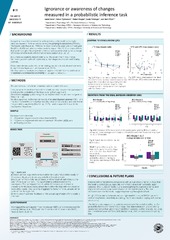Ignorance or awareness of changes measured in a probabilistic inference task
Permanent lenke
https://hdl.handle.net/10037/11809Dato
2017Type
Conference objectKonferansebidrag
Forfatter
Kreis, Isabel Viola; Tjelmeland, Håkon; Biegler, Robert; Tröbinger, Luzia Rosa; Pfuhl, GeritSammendrag
A cognitive bias often reported for schizophrenia is the tendency to make
decisions based on little evidence, namely the jumping to conclusions (JTC) bias.
The beads task (Huq et al., 1988) is the most commonly used task to investigate
the JTC and different attempts were made to explain the JTC. One proposition is
that patients might miscomprehend the task and assume volatility, i.e. a change
of the task environment, where there is none (Balzan et al., 2012).
In our task we explicitly stated volatility, i.e. the environment may change.
We tested patients with schizophrenia, autism diagnosis disorder and healthy
controls.
It has been demonstrated that when making decisions in volatile environments
humans follow Bayesian rules (Nassar et al., 2010).
We thus base our analysis on a Bayesian approach to identify the contribution
of expected and unexpected uncertainty on an agent’s behaviour.


 English
English norsk
norsk